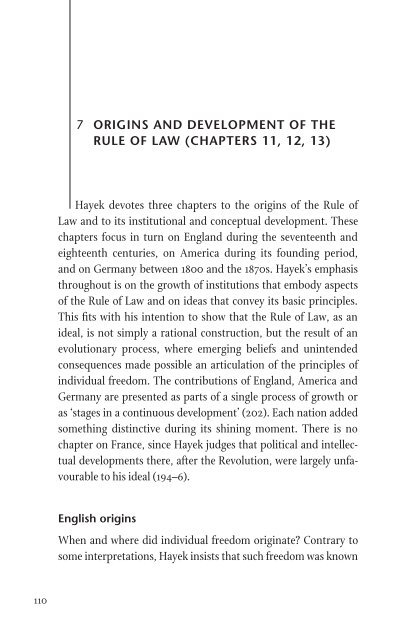Hayek's The Constitution of Liberty - Institute of Economic Affairs
Hayek's The Constitution of Liberty - Institute of Economic Affairs
Hayek's The Constitution of Liberty - Institute of Economic Affairs
Create successful ePaper yourself
Turn your PDF publications into a flip-book with our unique Google optimized e-Paper software.
o r i g i n s a n d d e v e l o p m e n t o f t h e r u l e o f l aw<br />
7 ORIGINS AND DEVELOPMENT OF THE<br />
RULE OF LAW (Chapters 11, 12, 13)<br />
Hayek devotes three chapters to the origins <strong>of</strong> the Rule <strong>of</strong><br />
Law and to its institutional and conceptual development. <strong>The</strong>se<br />
chapters focus in turn on England during the seventeenth and<br />
eighteenth centuries, on America during its founding period,<br />
and on Germany between 1800 and the 1870s. Hayek’s emphasis<br />
throughout is on the growth <strong>of</strong> institutions that embody aspects<br />
<strong>of</strong> the Rule <strong>of</strong> Law and on ideas that convey its basic principles.<br />
This fits with his intention to show that the Rule <strong>of</strong> Law, as an<br />
ideal, is not simply a rational construction, but the result <strong>of</strong> an<br />
evolutionary process, where emerging beliefs and unintended<br />
consequences made possible an articulation <strong>of</strong> the principles <strong>of</strong><br />
individual freedom. <strong>The</strong> contributions <strong>of</strong> England, America and<br />
Germany are presented as parts <strong>of</strong> a single process <strong>of</strong> growth or<br />
as ‘stages in a continuous development’ (202). Each nation added<br />
something distinctive during its shining moment. <strong>The</strong>re is no<br />
chapter on France, since Hayek judges that political and intellectual<br />
developments there, after the Revolution, were largely unfavourable<br />
to his ideal (194–6).<br />
English origins<br />
When and where did individual freedom originate? Contrary to<br />
some interpretations, Hayek insists that such freedom was known<br />
to the ancients, particularly in Athens at the time <strong>of</strong> its greatness<br />
and in late republican Rome. In fact, what classical authors said<br />
about individual freedom and its legal protections would greatly<br />
influence modern thought (164–7). Hayek’s interest, however, is<br />
not in the ancient world, but in the modern origins <strong>of</strong> individual<br />
freedom, understood both as the general condition <strong>of</strong> a people<br />
and as an ideal.<br />
<strong>The</strong> modern evolution <strong>of</strong> the Rule <strong>of</strong> Law began in seventeenth-century<br />
England. This evolution, as traced by Hayek,<br />
involves both events and ideas, with events and their unforeseen<br />
consequences taking priority. Thus he observes that English<br />
liberty ‘appeared first, as it probably always does, as a by-product<br />
<strong>of</strong> a struggle for power rather than as the result <strong>of</strong> deliberate aim’<br />
(162). Hayek refers here to the great struggle between king and<br />
Parliament that began soon after Elizabeth’s death in 1603 and<br />
convulsed seventeenth-century England; the liberty <strong>of</strong> the individual<br />
‘emerged [from it] as a by-product’ (167). <strong>The</strong> conflict<br />
with Parliament was provoked by the economic policies <strong>of</strong> Elizabeth’s<br />
successors, particularly their attempts to establish industrial<br />
monopolies and to impose severe regulations on economic<br />
activity. <strong>The</strong>se policies led to demands for ‘equal laws for all<br />
citizens’ and for adherence to ‘the certain rule <strong>of</strong> law,’ as distinguished<br />
from uncertain and arbitrary government. Ways to limit<br />
royal discretion and bring the king under the law were discussed<br />
extensively and continuously throughout the Civil War. From<br />
this discussion there gradually emerged all the political ideals<br />
‘which were thenceforth to govern English political evolution’<br />
(168).<br />
<strong>The</strong> evolutionary process that Hayek is describing was highly<br />
compressed. By 1660, when the Stuart monarchy was restored,<br />
110<br />
111












